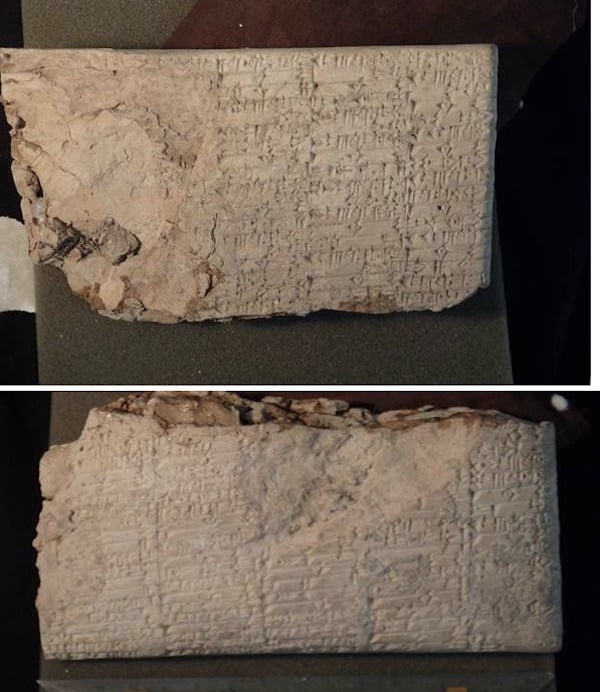Art World
Why the Feds Were Smart Not to Throw the Book at Hobby Lobby for Buying Iraqi Loot
Executives may not face criminal charges, but there are intricate tactical considerations to take into account.

Executives may not face criminal charges, but there are intricate tactical considerations to take into account.

This week, news of Hobby Lobby’s purchase of looted artifacts for its proposed Museum of the Bible took the media by storm. As an art and cultural heritage law attorney and professor, I wasn’t surprised by the news itself. After all, unscrupulous collectors have acquired stolen antiquities for generations.
More interesting has been the public outcry, particularly from cultural heritage commentators, lamenting the fact that the government did not pursue tougher criminal penalties against Hobby Lobby’s executives. Yet this kind of criticism, I believe, misinterprets what it would mean for the government to pursue the case, while underplaying the significance of the actual results.
I served as a legal expert on cultural heritage to the Eastern District of New York on this matter, and my consultation with the government is confidential; however, I’m able to comment on facts that are public. Here are a few issues that I think are worth taking into account.
The Burden of Proof
First of all, it is important to remember that a criminal litigation is accompanied by a heavy burden of proof; the government must prove guilt “beyond a reasonable doubt.”
What would that mean in the Hobby Lobby case? Proving criminal liability for the purchase of looted antiquities requires evidence of scienter (knowledge) on the part of a defendant. Proving such “knowledge” is inherently difficult.
In the case at hand, there has been outcry that Hobby Lobby’s representatives knew about the looted nature of its acquisitions because they had consulted with a cultural heritage expert prior to the purchase of works. However, an expert’s general advice concerning heightened risk of acquiring Iraqi objects unfortunately does not necessarily prove knowledge about the status of specific objects.
Moreover, Hobby Lobby is a huge company with numerous employees and executives who have access to a variety of different information sources. It simply might not be possible to prove that all high-ranking members of, or purchasers within, the organization were provided with all the relevant information in this case.
Proving scienter by the parties involved in the acquisition of works is a tremendous burden. Even though some knew of the illicit nature of the purchases, they could easily conceal their guilt by hiding their actions, assigning them to other parties within the organization.

Cuneiform tablets attached as exhibits to the Department of Justice civil complaint. Courtesy US Department of Justice.
Weakness in Numbers
Additionally, this case differs from others involving looted art that involve a single, highly valuable work. Ironically, the very scope of the Hobby Lobby case makes it difficult to prosecute.
Proving origin is easier for larger and more distinctive pieces that leave a more traceable record. The pieces acquired by Hobby Lobby are harder to trace due to their lower values and commonplace nature.
Hobby Lobby acquired thousands of relatively inexpensive and, frankly, ordinary pieces. For the government to prosecute a case for thousands of pieces, it would have the burden of proving that each one was stolen, taken in violation of a national patrimony law (in this case, Iraq’s law) or international law. This would require the government to prove, definitively, that all or a substantial number of the items in the vast trove did actually come from Iraq, and were removed illicitly.
This type of investigation doesn’t come cheap. The heavy burden of proof comes at an exorbitant cost. Experts would need to be hired to trace the origins of every object, resulting in the expenditure of significant resources.
The Opportunity Cost
This relates to the final consideration: If the government were to pursue criminal prosecution, it would likely lead to protracted litigation, depriving authorities of the financial and human resources to pursue other important matters during the investigation and trial.
Rather than face the heavy burden of a criminal case and devote financial resources and excessive amounts of time to it, the government found it more efficient to pursue a civil resolution. In this civil case, Hobby Lobby didn’t fight as ardently as would be expected in a criminal prosecution. And it got results: the company agreed to return the artifacts in question.
As part of the settlement, Hobby Lobby also adopted a list of serious reforms: It will pay a sum of $3 million; adopt internal policies governing its importation and purchase of cultural property; provide appropriate training to its personnel; hire qualified outside customs counsel and customs brokers; and submit quarterly reports to the government on all cultural property acquisitions for the next 18 months.
It would, of course, have been satisfying to learn that the guilty individuals at Hobby Lobby went to jail. It is painful to witness destruction of our shared heritage, to know that greedy individuals would rob humanity of its treasures, and that the restitution of the looted objects will never compensate mankind for the loss of archaeological context.
However, the very real positive outcomes should ease our disappointment. In this case, the disputed objects were recovered with minimal resources spent, and Hobby Lobby agreed to amend its acquisitions policies.
More than that, the Museum of the Bible is now under major public scrutiny. Whether a civil or criminal case was filed, the government’s decision to pursue this matter has brought Hobby Lobby under intense examination, potentially stopping further destructive acts.

The bronze doors marking the grand entrance of the Museum of the Bible. Image courtesy Museum of the Bible.
The End of Ignorance
This outcome is a major win for all players in the cultural heritage world.
Perhaps the most interesting aspect of this case concerns the oft-cited “willful ignorance” defense. Hobby Lobby never admitted guilt, but defended its actions by claiming ignorance and characterizing the acquisitions as “regrettable mistakes.” They brazenly stated that, “The company was new to the world of acquiring these items and did not fully appreciate the complexities of the acquisitions process.”
Cultural heritage specialists have long cried foul when circumstances suggest that a collector turned a blind eye to red flags. In this case, Hobby Lobby did not even turn a blind eye. The company actually sought out one of the best known cultural experts—and then ignored her advice.
This wasn’t willful ignorance, but the willful ignoring of advice.
Is that acceptable? This case is an opportunity for all participants in the cultural heritage profession to examine and establish reasonable acquisition standards.
This point should not be missed: The government took the Hobby Lobby case as a valuable opportunity to examine the antiquities market and to work to bring some light to a world which is characterized as being highly unregulated.
I applaud the government for wisely devoting resources in this case against Hobby Lobby, even after realizing that a criminal case carried too many risks, costs, and high burdens. The authorities have pursued the corporate giant in an effective way that has placed both Hobby Lobby and the Museum of the Bible under intense scrutiny.
As a result, Hobby Lobby will be forced to be far more cautious and vigilant in future purchases. The “ignorance defense” will be much harder to claim now. The next time they make a “regrettable mistake,” it may indeed land them behind bars.
Leila Amineddoleh is the founder of Amineddoleh & Associates LLC, an art, cultural heritage, and intellectual property law firm. She also teaches Art Crime at NYU, and Art Law at Fordham University School of Law and St. John’s School of Law.